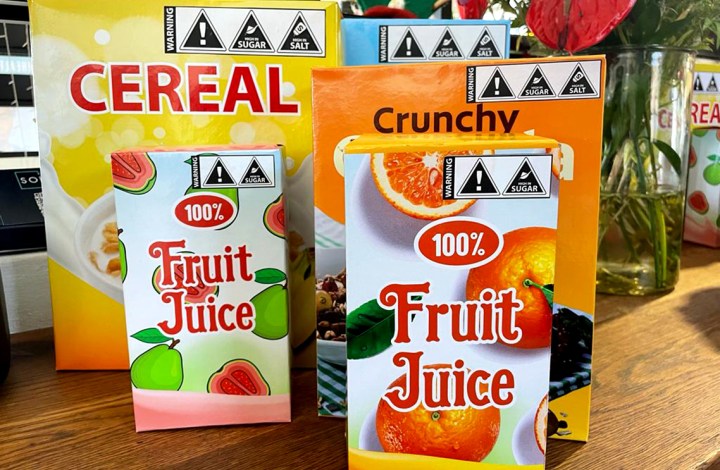
NUTRITION LABELLING
Health department says draft legislation to regulate unhealthy food packaging expected soon

The national health department says it is ‘on the right track’ to publish long-awaited draft legislation that is likely to propose warning labels and tighter advertising on the unhealthy, processed foods flooding supermarket shelves. The department’s statement comes six years after similar changes were originally proposed.

In May 2014, the national health department proposed amending the country’s 1972 Foodstuffs, Cosmetics and Disinfectants Act to introduce not only mandatory nutrition labelling, but also front-of-package labels on unhealthy foods.
Currently, companies in South Africa are not required to provide nutritional labelling on foods. And although many do, information isn’t standardised or user-friendly. Meanwhile, almost three dozen countries around the world already use some form of front-of-package labels to help consumers better identify unhealthy foods.
After receiving a large number of comments on its original 2014 proposals, the national health department commissioned local research to help inform the next iteration of draft legislation. In particular, the national health department turned to local universities to unpack what should be on labels and how these labels should look.
Public comment
Six years later, that work has been completed and national health department spokesperson Foster Mohale said the department expects to release new regulations soon for public comment. In a statement issued late last Friday, Mohale said although the regulations were still being reviewed by legal experts, the department expected proposals to be published for public comment soon.
The draft legislation has been with the department’s own legal team since at least January.
“There is good evidence internationally that a simplified system of labelling which consumers can understand is an effective means of providing consumers with information,” Mohale’s statement said, adding, “The intention of the draft labelling regulations is to provide clear guidance on the ‘dos’ and ‘don’ts’ regarding the information provided on the labels and in advertisements of foodstuffs, which will be beneficial to both consumers and manufacturers.”
In addition, Mohale said the Department of Planning, Monitoring and Evaluation had undertaken a socioeconomic impact assessment of proposals contained in the new proposals.
Visit Daily Maverick’s home page for more news, analysis and investigations
Multiple studies published in the past two years have shown that stark, black-and-white warning labels on foods high in ingredients such as salt, sugar and fat would help South Africans better recognise unhealthy foods and could help them make better choices at the till.
Most recently, research published in research journal Appetite found these triangle-shaped black-and-white alerts worked best to help South Africans identify unhealthy foods, when compared with two systems sometimes favoured by some companies globally, namely: robot-colour-coded label showing grams of ingredients per serving or a single colour measure of how much of your daily allowance was represented in an average helping.
Based in part on these findings, regulations are expected to propose implementing black-and-white food warning labels for processed products high in fat, sugar and salt, which are helping drive epidemics of diabetes, high blood pressure and heart disease in South Africa. About half of South Africa’s leading causes of natural death can be linked partly to diet.
Nearly 80% of packaged foods on major South African supermarket shelves were found to be ultra-processed, according to a July 2021 study published in the journal Nutrients. Ultra-processed foods are nutrient-scarce, but cheap to produce and are loaded with fat, salt and sugar.
Obesity and diabetes
Eating large amounts of ultra-processed food puts you at risk of developing — for instance — obesity and type 2 diabetes, show three large research reviews. It’s also thought to increase your risk of cerebrovascular problems or issues with blood flow to the brain that can lead to strokes.
Emerging research suggests chemicals in ultra-processed foods may, for example, interfere with the signals our bodies use to tell our brains that we’re full after a meal.
As yet to be published regulations could also recommend warning labels for products containing sweeteners, based on recommendations published by local researchers in an August 2021 study, also published in Nutrients.
Scientists are still not certain whether the use of sweeteners leads to better health in the long term, including slimmer waistlines or healthier teeth, shows a 2019 British Medical Journal research review. Researchers warn there’s also not enough available information to rule out that sugar substitutes could come with potential harms.
“Healthy food choices are an integral part of a healthy lifestyle,” Mohale said. “It is important to strengthen the current regulations to protect consumers against non-nutritious food (and) confusing labelling and marketing.” DM/MC




















 Become an Insider
Become an Insider
Comments - Please login in order to comment.